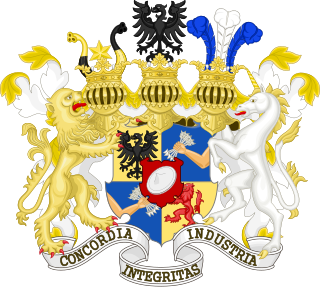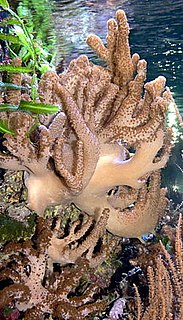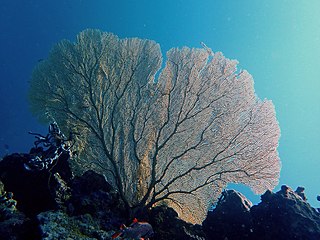
A language family is a group of languages related through descent from a common ancestral language or parental language, called the proto-language of that family. The term "family" reflects the tree model of language origination in historical linguistics, which makes use of a metaphor comparing languages to people in a biological family tree, or in a subsequent modification, to species in a phylogenetic tree of evolutionary taxonomy. Linguists therefore describe the daughter languages within a language family as being genetically related.

Flowering plants, also known as Angiospermae, meaning enclosed seeds in Greek, are the most diverse group of land plants with 64 orders, 416 families, approximately 13,000 known genera and 300,000 known species.

Charles Milles Manson was an American criminal who led the Manson Family, a cult based in California, in the late 1960s. Some of the members committed a series of nine murders at four locations in July and August 1969. In 1971, Manson was convicted of first-degree murder and conspiracy to commit murder for the deaths of seven people, including the film actress Sharon Tate. The prosecution contended that, while Manson never directly ordered the murders, his ideology constituted an overt act of conspiracy.

The British royal family comprises Queen Elizabeth II and her close relations. There is no strict legal or formal definition of who is or is not a member. Many members represent the British monarchy and support the monarch in undertaking public engagements and often pursue charitable work and interests. The royal family are regarded as British cultural icons.
Family is one of the eight major hierarchical taxonomic ranks in Linnaean taxonomy; it is classified between order and genus. A family may be divided into subfamilies, which are intermediate ranks between the ranks of family and genus. The official family names are Latin in origin; however, popular names are often used: for example, walnut trees and hickory trees belong to the family Juglandaceae, but that family is commonly referred to as being the "walnut family".

In some cultures, a surname, family name, or last name is the portion of one's personal name that indicates one's family, tribe or community.

The Rothschild family is a wealthy Jewish family originally from Frankfurt that rose to prominence with Mayer Amschel Rothschild (1744–1812), a court factor to the German Landgraves of Hesse-Kassel in the Free City of Frankfurt, Holy Roman Empire, who established his banking business in the 1760s. Unlike most previous court factors, Rothschild managed to bequeath his wealth and established an international banking family through his five sons, who established businesses in London, Paris, Frankfurt, Vienna, and Naples. The family was elevated to noble rank in the Holy Roman Empire and the United Kingdom. The family's documented history starts in 16th century Frankfurt; its name is derived from the family house, Rothschild, built by Isaak Elchanan Bacharach in Frankfurt in 1567.

Family Guy is an American adult animated sitcom created by Seth MacFarlane and developed by MacFarlane and David Zuckerman for the Fox Broadcasting Company that premiered on January 31, 1999. The series is produced by Fuzzy Door Productions.

A dynasty is a sequence of rulers from the same family, usually in the context of a feudal or monarchical system, but sometimes also appearing in republics. Alternative terms for "dynasty" may include "house", "family" and "clan", among others. The longest surviving dynasty in the world is the Imperial House of Japan, otherwise known as the Yamato dynasty, whose reign is traditionally dated to 660 BCE and historically attested from 781 CE.

A given name is the part of a personal name that identifies a person, potentially with a middle name as well, and differentiates that person from the other members of a group who have a common surname. The term given name refers to a name bestowed at or close to the time of birth, usually by the parents of the newborn. A Christian name is the first name which is given at baptism, in Christian custom.

Seth Woodbury MacFarlane is an American actor, screenwriter, producer, director, and singer, known for his work in animation and comedy. He is the creator of the television series Family Guy (1999–present) and The Orville (2017–present), and co-creator of the television series American Dad! (2005–present) and The Cleveland Show (2009–2013). He also wrote, directed, and starred in the films Ted (2012), its sequel Ted 2 (2015), and A Million Ways to Die in the West (2014).

The longhorn beetles (Cerambycidae), also known as long-horned or longicorns, are a large family of beetles, with over 35,000 species described, slightly more than half from the Eastern Hemisphere. Most species are characterized by extremely long antennae, which are often as long as or longer than the beetle's body. In various members of the family, however, the antennae are quite short and such species can be difficult to distinguish from related beetle families such as the Chrysomelidae. The scientific name of this beetle family goes back to a figure from Greek mythology: after an argument with nymphs, the shepherd Cerambus was transformed into a large beetle with horns.

Alcyonacea, or soft corals, are an order of corals. In addition to the fleshy soft corals, the order Alcyonacea now contains all species previously known as "gorgonian corals", that produce a more or less hard skeleton, though quite different from "true" corals (Scleractinia). These can be found in suborders Holaxonia, Scleraxonia, and Stolonifera. They are sessile colonial cnidarians that are found throughout the oceans of the world, especially in the deep sea, polar waters, tropics and subtropics. Common names for subsets of this order are sea fans and sea whips; others are similar to the sea pens of related order Pennatulacea. Individual tiny polyps form colonies that are normally erect, flattened, branching, and reminiscent of a fan. Others may be whiplike, bushy, or even encrusting. A colony can be several feet high and across, but only a few inches thick. They may be brightly coloured, often purple, red, or yellow. Photosynthetic gorgonians can be successfully kept in captive aquaria.

In human society, family is a group of people related either by consanguinity or affinity. The purpose of families is to maintain the well-being of its members and of society. Ideally, families would offer predictability, structure, and safety as members mature and participate in the community. In most societies, it is within families that children acquire socialization for life outside the family, and acts as the primary source of attachment, nurturing, and socialization for humans. Additionally, as the basic unit for meeting the basic needs of its members, it provides a sense of boundaries for performing tasks in a safe environment, ideally builds a person into a functional adult, transmits culture, and ensures continuity of humankind with precedents of knowledge.
The American Mafia, commonly referred to in North America as the Italian-American Mafia, the Mafia, or the Mob, is a highly organized Italian-American criminal society and criminal organization. The organization is often referred to by its members as Cosa Nostra and by the American government as La Cosa Nostra (LCN). The organization's name is derived from the original Mafia or Cosa nostra, the Sicilian Mafia, with "American Mafia" originally referring simply to Mafia groups from Sicily operating in America, as the organization initially emerged as an American offshoot of the Sicilian Mafia. However, the organization gradually evolved into a separate entity partially independent of the original Mafia in Sicily, and it eventually encompassed or absorbed other Italian-American gangsters and Italian-American crime groups active in the United States and Canada that were not of Sicilian origin. In North America, it is often colloquially referred to as the Italian Mafia or Italian Mob, though these terms may also apply to the separate yet related Sicilian Mafia or other organized crime groups in Italy.

Briareum violaceum, commonly called star polyp, is a species of a soft coral in the family Briareidae.
Modern Family is an American mockumentary family sitcom television series created by Christopher Lloyd and Steven Levitan for the American Broadcasting Company. It ran for eleven seasons, from September 23, 2009, to April 8, 2020. It follows the lives of three diverse family set-ups in suburban Los Angeles, linked by patriarch Jay Pritchett.

Scleraxonia is a suborder of corals, a member of the phylum Cnidaria.
A protein superfamily is the largest grouping (clade) of proteins for which common ancestry can be inferred. Usually this common ancestry is inferred from structural alignment and mechanistic similarity, even if no sequence similarity is evident. Sequence homology can then be deduced even if not apparent. Superfamilies typically contain several protein families which show sequence similarity within each family. The term protein clan is commonly used for protease and glycosyl hydrolases superfamilies based on the MEROPS and CAZy classification systems.

Briareum is a genus of soft corals in the family Briareidae. The coral is cultivated by aquarium owners for its fluorescing polyps, which reveal themselves under actinic light. The genus is in need of extensive examination, as many specimens sold by marketers display unique and similar characteristics, but are often labeled as one species, Pachyclavularia violacea.

















